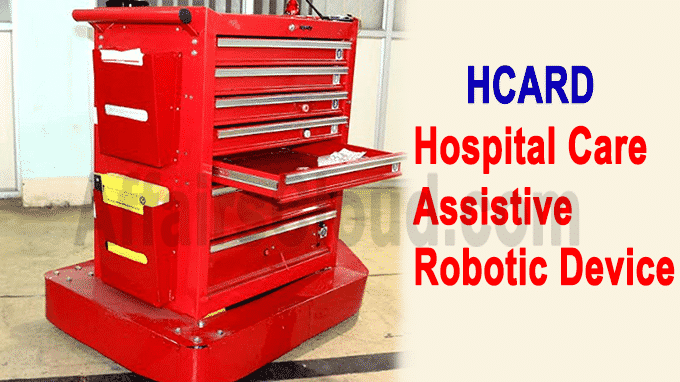On April 29, 2020, The robotic device HCARD (Hospital Care Assistive Robotic Device) helps the frontline healthcare workers in maintaining physical distance from those infected by Coronavirus (COVID-19). The device was developed by CSIR- Central Mechanical Engineering Research Institute (CMERI), Durgapur, West Bengal. Key Points:
Key Points:
i.About HCARD: The robot can be controlled & monitored by a nursing booth with a control station having such features as navigation, drawer activation for providing medicines and food to patients, sample collection and audio-visual communication.
ii.The device is equipped with various state-of-the-art technologies and works both in automatic as well as manual modes of navigation.
iii.The cost of this device is less than Rs 5 lakh and the weight is less than 80 kilograms.
iv.CSIR-CMERI is working very effectively to minimize the impact of COVID-19 through technological interventions.
v.According to WHO (World Health Organization), personal protective equipment (PPE) is very important in preventing transmission of Coronavirus in the society, thus the institute has channelized its resources optimally to develop PPE & community-level safety equipment for helping the public at large and healthcare institutions.
vi.Other technologies: Scientists at CMERI have also developed a few other customized technologies including Disinfection Walkway, Road Sanitizer Unit, Face Mask, Mechanical Ventilator and Hospital Waste Management Facility.
About Central Mechanical Engineering Research Institute:
The Central Mechanical Engineering Research Institute (also known as CSIR-CMERI Durgapur or CMERI Durgapur) is a public engineering research and development institution and the only national level research institute in the field of mechanical engineering in India. It is a constituent laboratory of the Indian Council of Scientific and Industrial Research (CSIR).
Director– Professor Harish Hirani.
Motto– yantramewasmaakam mantra (Machine is our Incantation).




